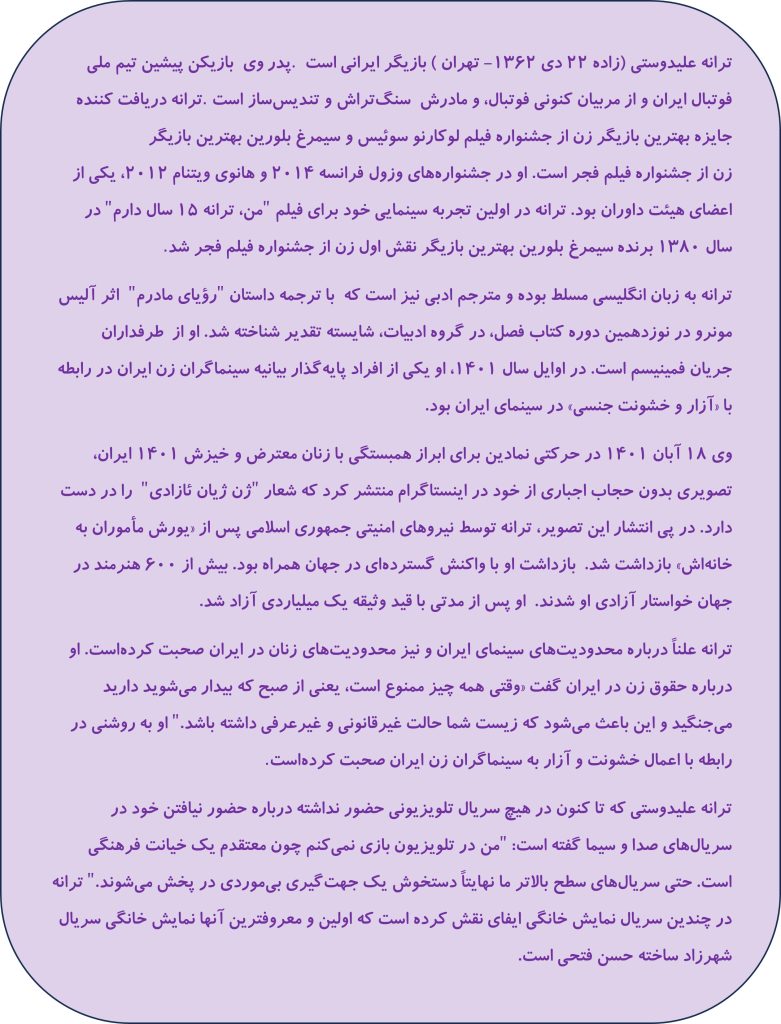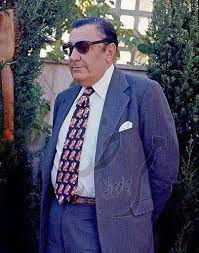
Ghola:mhossein Bana:n
(Musician, Singer and actor)
Gholamhosein Banan (born May 5, 1911, in Tehran – died February 27, 1986, in Tehran) was a singer of Iranian classical music who was active in the field of national music of Iran from 1927 until 1968. He was a member of the Radio Music Council, a vocal instructor at the Tehran Conservatory of Music, and the founder of the Iranian Music Society. He was the first Iranian singer familiar with international musical notation (sheet music). In addition to singing, he was also skilled at playing the piano.
Throughout his artistic career, Banan performed approximately 350 songs. His voice is characterized by its nuances and embellishments. He mastered both traditional and classical Iranian singing as well as new and modern Iranian melodies, with examples including the pieces “Elaheye Naz” and “Royaye Hasti.”
Banan also received training in acting and appeared in a film titled “Toofan-e Zendegi,” directed by Ali Daryabeigi and Ismail Koushan, alongside well-known figures of his time in 1948. In this film, Banan performed two of his famous songs live.
The song “Roya:ye Hasti” performed by Banan :
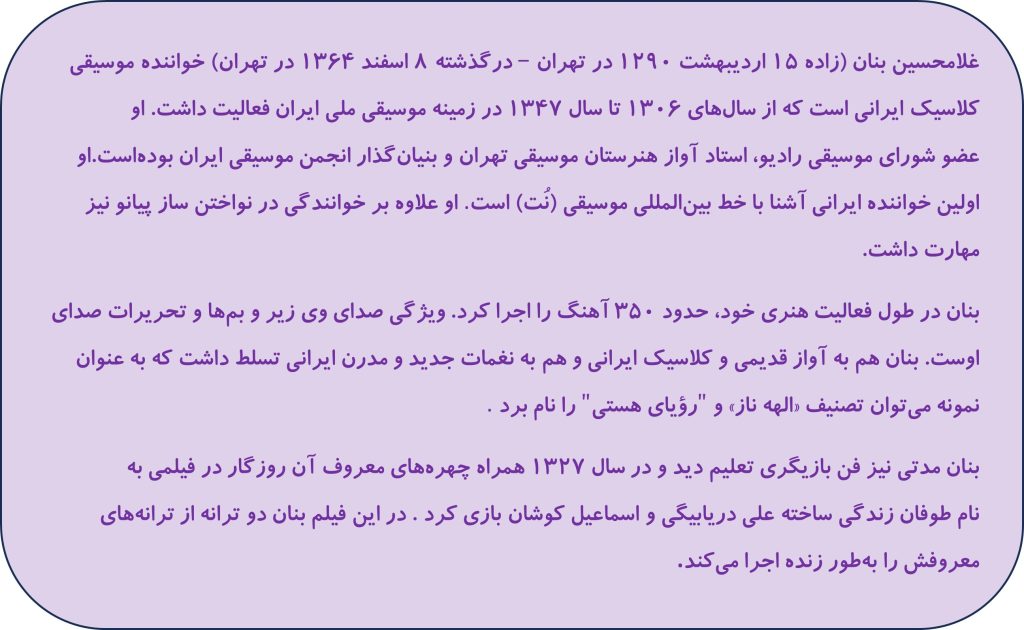
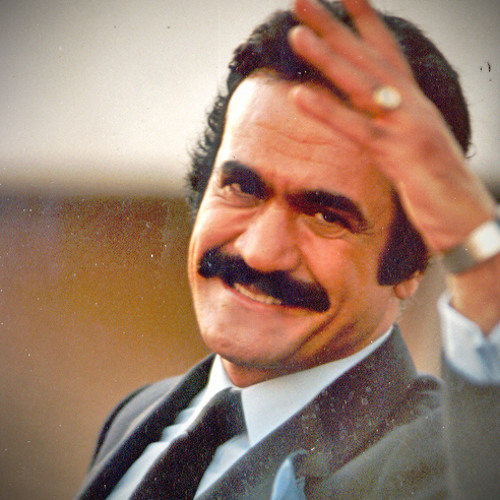
Fereydoun Farrokhza:d
(actor, poet and showman)
Fereydoun Farrokhzad (Tehran, 1938 – Bonn, 1992) was an Iranian showman, poet, radio and television producer, singer, television and radio host, songwriter, composer, actor, and political activist who opposed the Islamic Republic of Iran. He held a PhD in political science and was the innovator of several television programs, including the successful “Silver Carnation” program in Iran, which introduced many of today’s well-known Iranian artists to the public.
Farrokhzad was also active in music, singing Western melodies in connection with Persian poetry, such as “Adagio” and “Do You Like Brahms?” He released many music albums, including “Kasi Miayad,” “Khatereh Yek,” “Shab Bood Biaban Bood,” “Shahre Man Aftab Mishavad,” and “Ahanghaye Talaei.”
After the 1979 Iranian Revolution, Fereydoun Farrokhzad spent some time in detention and then emigrated to Los Angeles, USA. He published his book “In the End, the Sentence Begins with Love” in this city. After a while, he settled in Bonn, Germany, and continued his political activities against the Islamic Republic.
Following the revolution, he held numerous concerts in various cities around the world. Farrokhzad also produced the radio program “Hello Neighbors,” which was broadcast for Iran for four years. His last poetry book, titled “I Am Tired of Dying,” criticized the religious government.
The traditional short video clip performed by Fereydoun:
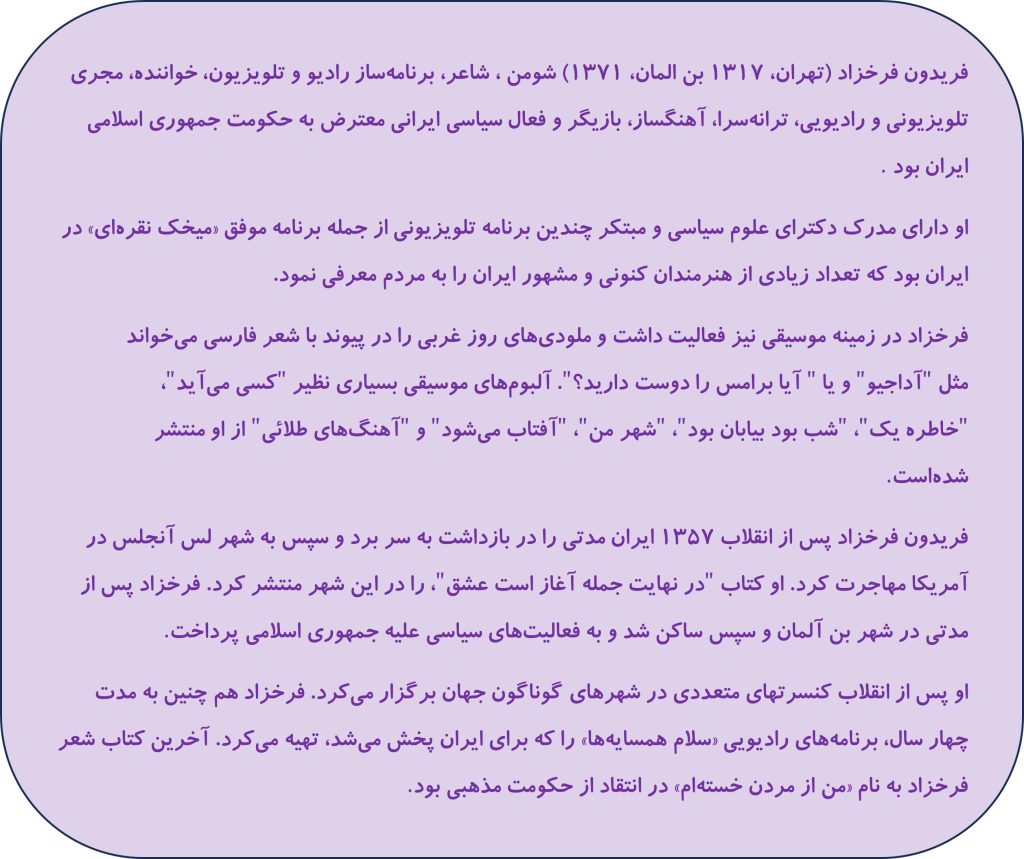
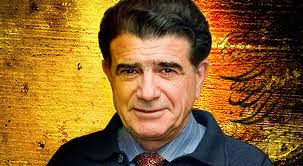
Mohammad Reza: Shajaria:n
(Musician and Singer)
Mohammad-Reza Shajarian was born on October 23, 1940, into a traditional and art-loving family in Mashhad. He is one of the most beloved and renowned singers of Iranian classical music. It is impossible to discuss classical music without mentioning Master Mohammad-Reza Shajarian. This esteemed artist, who was not only a singer but also skilled in composition and calligraphy, has played a significant and prominent role in traditional Iranian music.
Master Mohammad-Reza Shajarian was the head of the Supreme Council of the House of Music of Iran, the founder of the Shahnaz Group, Delavaz Company, and the Artistic Garden of Bam. He was also the creator of several musical instruments.
In his concerts, he used poetry from renowned poets such as Hafez, Rumi, Attar, Baba Tahir, and Khayyam, as well as modern poetry from poets like Sohrab Sepehri, Mehdi Akhavan Sales, Mohammad-Reza Shafiei Kadkani, and Hossein Beyhaqi.
Shajarian worked for around half a century in the realm of traditional Iranian music, creating unique and lasting works. He released over 50 official albums in collaboration with great artists.
Among the joint and popular works of Master Shajarian and Lotfi, many of which are reinterpreted ancient compositions with a nostalgic atmosphere, are “Eshq Danad,” “Mo’ammaye Hasti,” and “Cheshmeh Noush.” The works “Astan-e Janan” and “Serr-e Eshq,” performed in collaboration with Moshtaghi, are also considered beautiful and enjoyable pieces by Master Shajarian.
Other famous works by Master Mohammad-Reza Shajarian include the well-known composition “Iran, O Land of Hope” and the reinterpretation of “Az Khun-e Javanane Vatan,” performed during his collaboration with the Chavosh group. The beloved Iranian singer, composer, and calligrapher passed away at the age of 80.
The song “Morghe Sahar” performed by Shajarian :
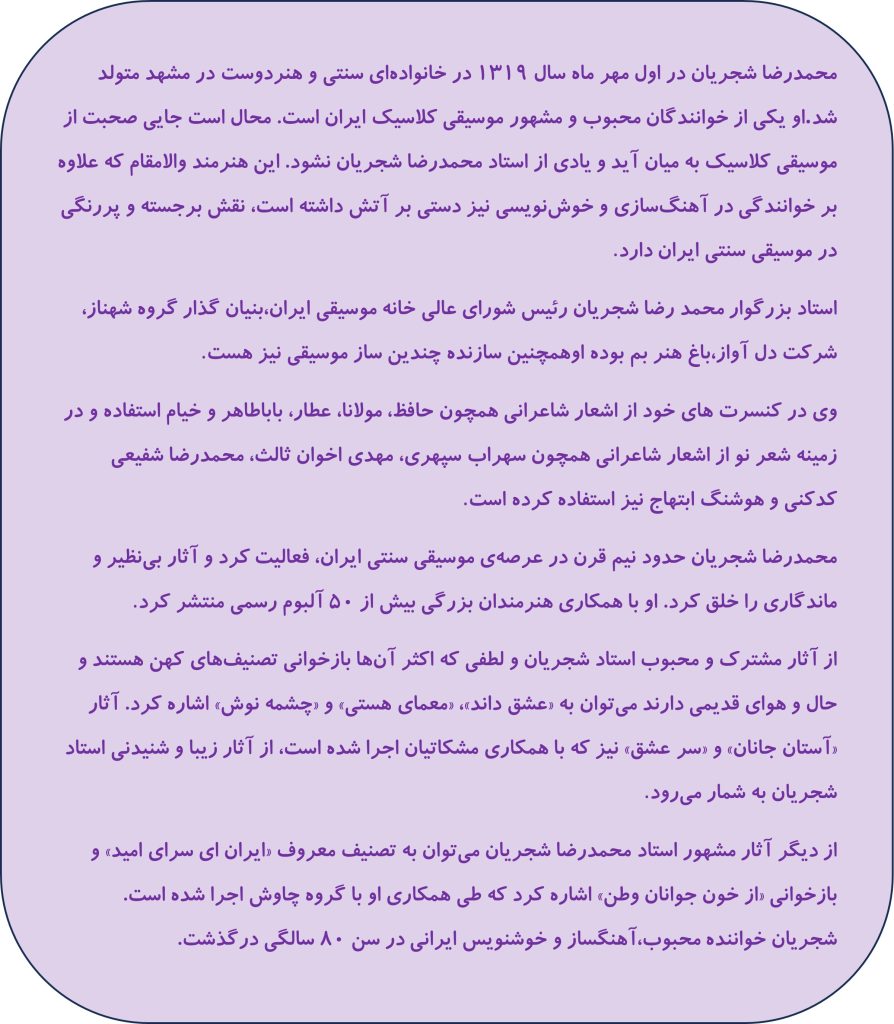

Golshifteh Fara:ha:ni
(Actress)
Golshifteh Farahani (Rahavard) was born on July 9, 1983, in Tehran into an artistic family. She entered the Conservatory of Music at the age of 12. At 14, she was cast for the role of “Mim” in Dariush Mehrjui’s film “The Pear Tree.” Golshifteh won the award for Best Actress in the International section of the 16th Fajr Film Festival (1997) for her performance in that film, an award that significantly impacted her destiny.
Among other acclaimed films featuring this well-known actress is “About Elly,” released in 2008, which received numerous nominations and awards worldwide.
After this film, Golshifteh immigrated to Paris and ended her activities in Iranian cinema. However, she has appeared in several popular films, including: Body of Lies (2008), The Patience Stone (2012), Gods and Kings (2016), Paterson (2016), Pirates of the Caribbean: Dead Men Tell No Tales (2017) and Extraction (2020), and she received positive feedback for these roles.
It is noteworthy that Golshifteh Farahani was nominated for the Most Promising Actress award for her role in “The Patience Stone.” She also won Best Actress from the Three Continents Festival for her performance in “Boutique.”
“Body of Lies” was the first foreign film in which she acted. In the first official poster of this Hollywood film published by Warner Bros., Golshifteh Farahani is listed as the fourth actor in the cast, credited as the first female actor in the film. Leonardo DiCaprio, Russell Crowe, and Mark Strong are among the actors whose names appear before hers on the film’s poster.
Farahani plays the role of a mother in the science fiction television series “Invasion” (2021–present) on Apple TV+, who is trying to protect her family during an alien attack.
An emotional short video clip of Golshifteh:
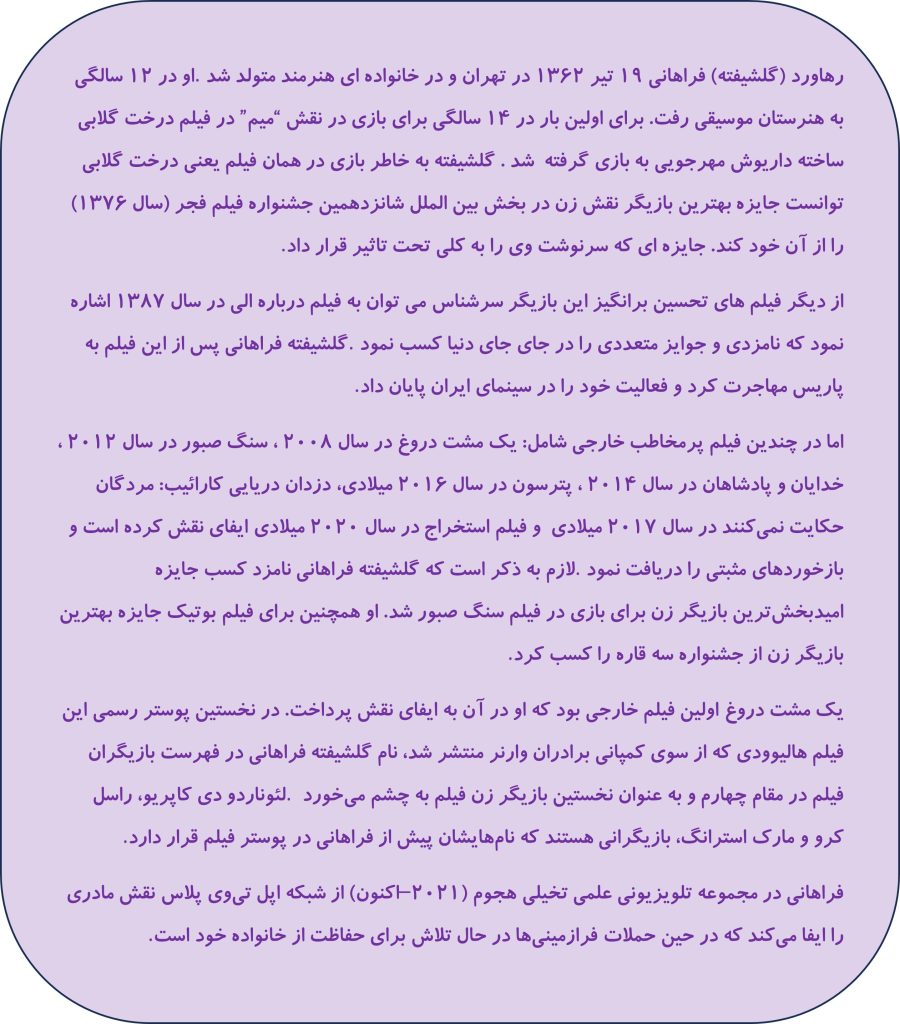
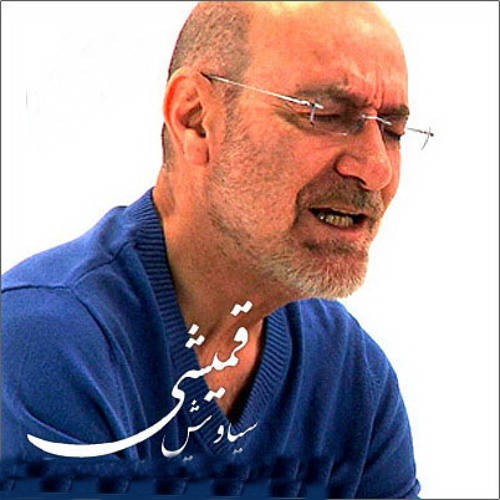
Siya:vash Qomeyshi
(Singer and songwriter)
Siyavash Qomeyshi, a beloved Iranian musician, composer, singer, and songwriter, was born on June 11, 1945, in Dezful. At the age of 14, he moved to London to join his siblings and studied there. Siyavash eventually earned a master’s degree in music composition from the Royal Society of Arts in London. After 11 years, he returned to Iran at the age of 25 in 1970. In Iran, he worked as a composer for radio and, like during his years in London, was involved with various groups, including The Rebels.
After the Iranian Revolution in 1979, he, along with many other artists, left Iran. He initially went to England and, after a few months, moved to Los Angeles in 1980, where he has resided ever since.
Siayvash Qomeyshi is the first Iranian artist to have independently performed all four main components of a music piece: lyrics, music, arrangement, and singing. He has released 18 official music albums, 25 singles, and one film score, and he is recognized as a pioneer of trance music in Iran.
Some of Siavash’s most important albums include: Ghesseye Gol o Tagarg (The Story of the Flower and Hail), Farangi (Frangis), Khab-e Baroon (Dream of Rain), Hekayat (Tale), Neghab (Mask), Bi-Sarzamin-tar az Bad (More Landless than the Wind), Zaman (Time), and Sargozasht (History). His latest song, titled “Taqdim,” was released in May 2024.
Siayvash Qameyshi has composed and sung in various styles, including rock, pop, trance, and house music, introducing himself on his website as “the pioneer of trance music in Iran.” Aref, a pop singer, was the first to recognize Siayvash’s talent in composition. “Ghesse Gol va Tegar” was Siavash’s first official composition for Iranian songs, which, along with several other songs he composed for Aref, represented a fresh style for both Aref and the entire pop music scene in those years in Iran.
The song “Golo o Tagarg” performed by Siyavash :
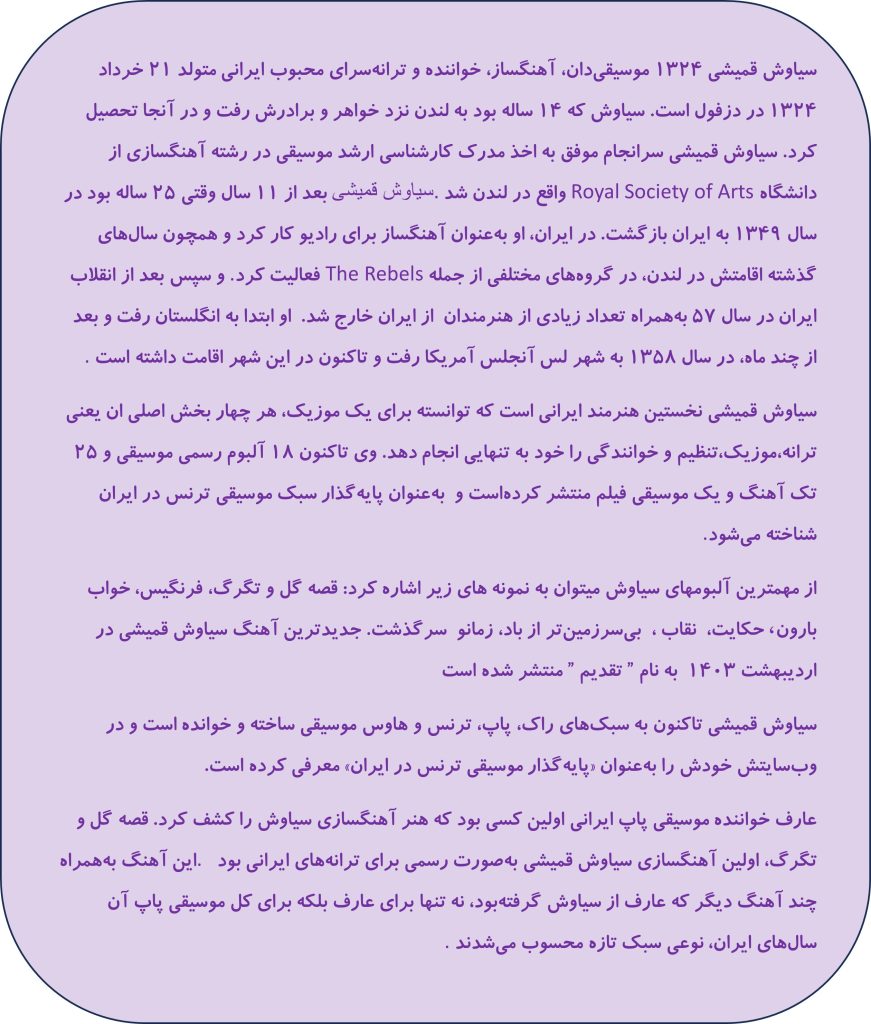
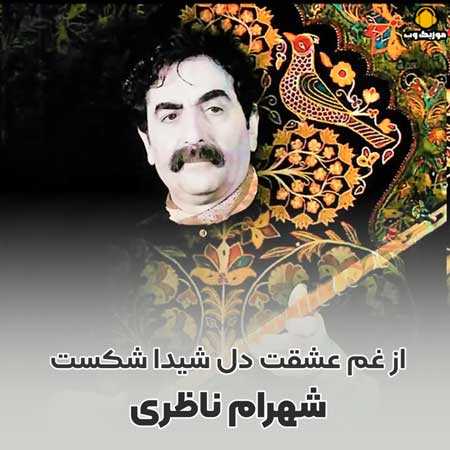
Shahra:m Na:zeri
(Singer and musician)
Shahram Nazeri (born February 18, 1950) is an Iranian musician and singer. He is a well-known vocalist in Iranian classical music, often referred to as the “Knight of Iranian Singing.” The Asia Society has named him the “Best Artist in Asia,” the New York Times referred to him as the “Nightingale of Persian Music,” and the Christian Science Monitor called him the “Luciano Pavarotti of Iran.” In 2007, he was awarded the Legion of Honor by the French government, and in 2014, he received the “National Order of Merit” from France.
Nazeri is also famous for performing works in his native language (Kurdish). Some of the most notable Kurdish pieces from Kermanshah that he has sung include the ancient compositions “Kabuki,” “Shirin Shirin,” and “Varan Varane,” which he has reinterpreted.
Shahram Nazeri’s first albums were collaborative works with Mohammad-Reza Shajarian, featuring patriotic themes and concepts like freedom, released by the Chavosh Association in the late 1970s. After the closure of the Chavosh Association, Nazeri dedicated himself to singing pieces primarily based on the poetry of Jalal al-Din Rumi in the 1980s, becoming the first singer to focus specifically on Rumi’s poetry.
Nazeri has been a pioneer in performing Rumi’s poetry. The albums “Masnavi Musa va Shabaan” and “Sedaye Sokhan-e Eshq” present a new approach to music and mystical poetry, which Nazeri created in the late 1970s and early 1980s.
Other notable works by him, based on Rumi’s poetry, include the album “Molaviye,” known outside of Iran as “Shour-e Roomi,” which was nominated for a Grammy Award in the United States in 2007. Indian-American philosopher Deepak Chopra also features in this album. He is the first singer to conduct research on reciting the Shahnameh and has performed stage readings of the Shahnameh in the United States, France, and Tunisia. Through his efforts and performances, Shahram Nazeri has paved the way for young singers to recite the Shahnameh. Albums based on Shahnameh poetry include “Derafsh-e Kaviya:ni” and “Kaveh Ahangar.”
The song “Jam’e Masta:n” performed by Shahram Nazari :
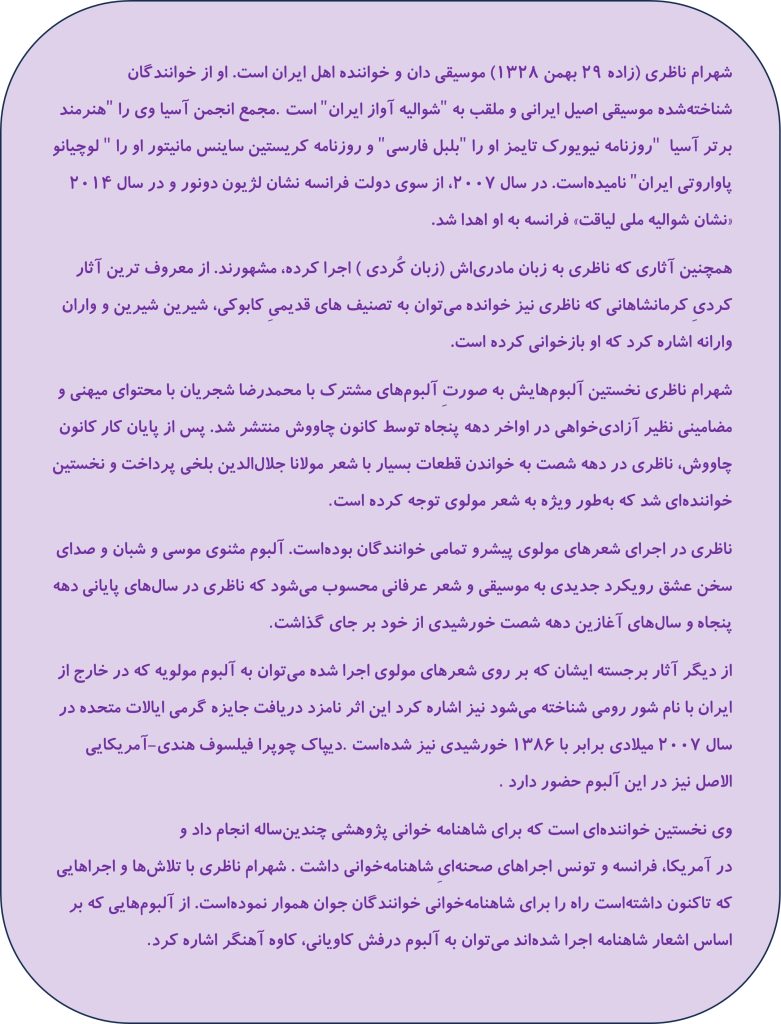
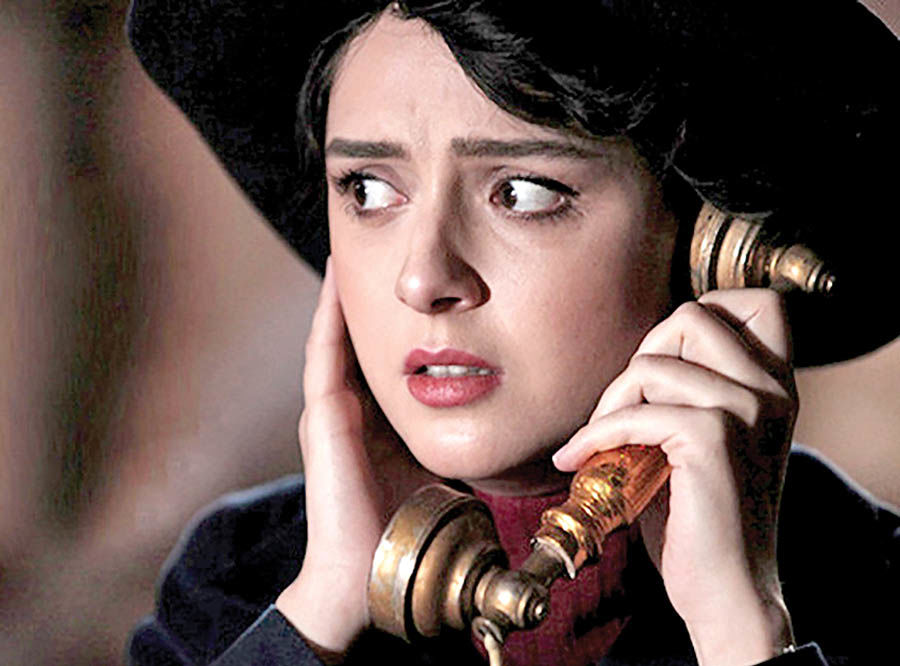
Tara:neh Alidoosti
(Actress)
Taraneh Alidoosti (born January 11, 1984, in Tehran) is an Iranian actress. Her father is a former player of the Iranian national football team and currently a football coach, while her mother is a stone carver and sculptor.
Taraneh has received the Best Actress award from the Locarno Film Festival in Switzerland and the Crystal Simorgh for Best Actress from the Fajr Film Festival. She served as a jury member at the Vezoul Festival in France in 2014 and the Hanoi Festival in Vietnam in 2012. In her first cinematic experience, she won the Crystal Simorgh for Best Leading Actress from the Fajr Film Festival for the film “I, Taraneh, am 15 years old” in 2001.
Fluent in English, Taraneh is also a literary translator, recognized for her translation of Alice Munro’s story “My Mother’s Dream,” which earned her a commendation in the 19th Season Book Awards in the literature category. She is an advocate of feminism. In early 2022, she was one of the founding members of the Iranian Women Filmmakers’ Statement regarding “sexual harassment and violence” in Iranian cinema.
On November 9, 2022, as a symbolic gesture of solidarity with protesting women and the 2022 uprising in Iran, she posted a hijab-free image of herself on Instagram holding a sign that read “Zan, Zendegi, Azadi” (Woman, Life, Freedom). Following the publication of this image, Taraneh was arrested by the security forces of the Islamic Republic after a raid on her home. Her arrest sparked widespread reactions around the world, and over 600 artists worldwide called for her release. She was later released on a one-billion-toman bail.
Taraneh has openly spoken about the restrictions in Iranian cinema and the limitations faced by women in Iran. Regarding women’s rights in Iran, she stated, “When everything is forbidden, it means that from the moment you wake up, you are fighting, which makes your existence feel illegal and unconventional.” She has clearly addressed the violence and harassment against women filmmakers in Iran.
Despite never having appeared in any television series, Taraneh has commented on her absence from programs produced by the state broadcaster, saying, “I don’t act on television because I believe it is a cultural betrayal. Even our higher-quality series ultimately fall prey to unnecessary bias in broadcasting.” Taraneh has played roles in several web series, the first and most famous of which is “Shahrzad,” directed by Hassan Fathipur.
A short video clip of Taraneh in Shahrzad Series
